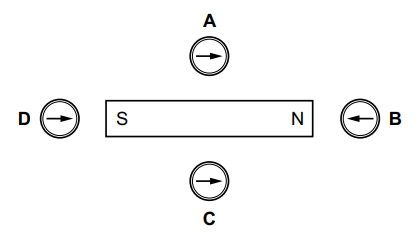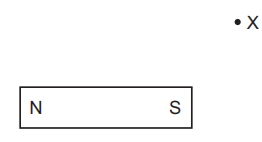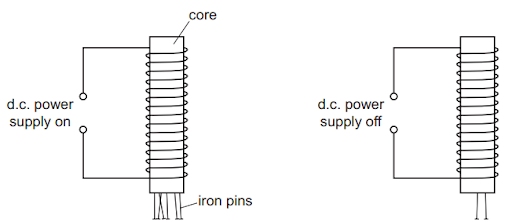Which of the lists of metals below contains only metals which are non-ferrous?
Iron, steel, nickel
Cobalt, copper, steel
Aluminium, brass, copper
Iron, tin, aluminium
Did this page help you?
Exam code: 0625 & 0972
Select a download format for Simple Phenomena of Magnetism
Select an answer set to view for
Simple Phenomena of Magnetism
Which of the lists of metals below contains only metals which are non-ferrous?
Iron, steel, nickel
Cobalt, copper, steel
Aluminium, brass, copper
Iron, tin, aluminium
Choose your answer
Did this page help you?
Which of the following choices of metal would be suitable for:
Use as a permanent magnet?
Use as the core in an electromagnet?
| Use as a permanent magnet | Use as the core of an electromagnet |
A | steel | iron |
B | steel | steel |
C | iron | iron |
D | iron | steel |
Choose your answer
Did this page help you?
Which of the lists below are metals that are ferrous?
aluminium and iron
steel and iron
steel and lead
tin and iron
Choose your answer
Did this page help you?
Which statement about a permanent bar magnet is incorrect?
The S-pole attracts the N-pole of another magnet
The S-pole repels the S-pole of another magnet
It cannot repel a non-magnetic material
It is made from a soft magnetic material (such as soft iron)
Choose your answer
Did this page help you?
Extended tier only
Which magnet has the strongest magnetic field?

Choose your answer
Did this page help you?
What material can a temporary magnet be made from?
plastic
soft iron
steel
wood
Choose your answer
Did this page help you?
The diagram shows a bar magnet and four plotting compasses.
Which compass correctly shows the direction of the magnetic field due to the magnet?

Choose your answer
Did this page help you?
Point X is near to a bar magnet, as shown

Which arrow indicates the direction of the magnetic field of the bar magnet at point X?

Choose your answer
Did this page help you?
A student makes a series of statements about a permanent bar magnet.
Which of them is true?
The North pole of a permanent bar magnet will repel the North pole of another magnet.
A permanent bar magnet must be made from a soft magnetic material.
A permanent bar magnet can repel a magnetic material.
The field lines of a permanent bar magnet cross each other where the field is strongest.
Choose your answer
Did this page help you?
A student lines up some permanent magnets with soft iron nails in between as shown in the diagram below.

What would the magnetic poles of locations X and Y be?
| X | Y |
A | north | north |
B | north | south |
C | south | north |
D | south | south |
Choose your answer
Did this page help you?
Which of the following statements could be used to describe something a permanent magnet could do?
It will repel non-magnetic materials.
It will repel non-ferrous materials.
It will attract ferrous materials.
It will have a single magnetic pole.
Choose your answer
Did this page help you?
The diagram shows two bar magnets, stored with metal keepers across the ends. The keepers help to keep the magnets magnetised.

The material used for the keepers becomes strongly magnetised when placed in contact with the magnets, but does not remain magnetised when taken away from the magnets.
What is a suitable metal to use for the magnets and what is a suitable metal to use for the keepers?
| Metal for keeper | Metal for magnet |
A | steel | steel |
B | iron | steel |
C | steel | iron |
D | iron | iron |
Choose your answer
Did this page help you?
Which test could be used to find which end of a magnet is the south pole?
putting it near a ferrous metal
putting it near a compass needle and see whether the needle points towards the pole
putting it near a compass needle and see whether the needle points away from the pole
putting it near a non-ferrous metal
Choose your answer
Did this page help you?
A student counts how many iron pins an electromagnet picks up when its power supply is switched on. Then, she counts how many pins are picked up when the power supply is switched off.

She repeats the experiment using cores made of different materials. The results are shown.
Which core is made out of soft iron?
| pins picked up with the power supply on | pins picked up with the power supply off |
|---|---|---|
A | 0 | 0 |
B | 2 | 7 |
C | 8 | 5 |
D | 12 | 0 |
Choose your answer
Did this page help you?
An unmagnetised piece of soft iron is placed close to a strong permanent magnet, as shown.

What is the induced polarity of end X of the soft iron and in which direction does the magnetic force act on the soft iron?
polarity of end X | direction of force on the soft iron | |
|---|---|---|
A | N | to the left |
B | N | to the right |
C | S | to the left |
D | S | to the right |
Choose your answer
Did this page help you?
A student has a collection of metal bars that keep sticking to each other. She suspects that they might be magnets, so she runs a test.
She holds end V of rod 1, near to each end of the two other rods. The ends are shown in the diagram below.

Her results are as follows:
End V:
Repels end W
Attracts end X
Attracts end Y
Attracts end Z
Which of the metal rods is a magnet?
1 and 2
2 and 3
1 only
2 only
Choose your answer
Did this page help you?
A student has what he believes to be a permanent magnet. He wants to find out which end is the magnet’s North pole.
What could he do to find out?
Put the magnet under a piece of paper, and sprinkle iron filings on top.
Put it near to a piece of magnetic material, like a steel paperclip.
Place a compass near it.
Put it near to a piece of ferrous material.
Choose your answer
Did this page help you?
A teacher, Mr. Garrison, brings a horseshoe magnet near to an iron bar as shown in the diagram.

Is the iron bar attracted to or repelled from the horseshoe magnet?
Which diagram shows the polarity of the poles that are produced in the iron bar?
Rod | Attracted / Repelled | Pole Distribution |
A | repelled |  |
B | repelled |  |
C | attracted |  |
D | attracted |  |
Choose your answer
Did this page help you?
A student wants to make an electromagnet that acts like a permanent magnet that will retain its magnetism after it is switched off. The student is using some easy-to-find materials that are in the school lab.

Which metal should the student use, and which setting on the power supply?
| Metal | Power supply setting |
A | Soft iron | 6V a.c. |
B | steel | 6V a.c. |
C | Soft iron | 6V d.c. |
D | steel | 6V d.c. |
Choose your answer
Did this page help you?
A student carries out an experiment to find out which of four metal rods makes the best permanent magnet.

The rod is attached to the south pole of a permanent magnet, and then paper clips are attached to the rod. The number of paper clips that can be held by the rod is counted.
The permanent magnet is then removed from the rod, and the number of paper clips that remain attached are counted.
The results are summarised in the table below.
Which of the rods becomes the strongest permanent magnet?
rod | number of paper clips held by the rod | |
when the magnet is present | when the magnet is removed | |
A | 5 | 2 |
B | 4 | 3 |
C | 2 | 0 |
D | 3 | 2 |
Choose your answer
Did this page help you?